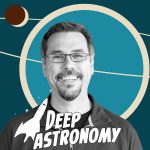Podcaster: Tony Darnell

Title: LISA Mission Update: The Future of Gravitational Wave Astronomy
Organization: Deep Astronomy
Link : https://deepastronomy.space
Twitter @DeepAstronomy, https://facebook.com/DeepAstronomy
YouTube: https://www.youtube.com/deepastronomy
Description:
Have you been wondering, as I have, what the latest news is on the amazing space telescope known as LISA? Well wonder no longer as members of the Laser Interferometer Space Antenna (LISA) team will be on hand to give us an update and answer your questions.
LISA will be the first space-based gravitational wave observatory. Selected to be ESA’s third large-class mission, it will address the science theme of the Gravitational Universe. LISA will consist of three spacecraft separated by 2.5 million km in a triangular formation, following Earth in its orbit around the Sun. Launch is expected in 2034.
LISA will aim to tackle a number of key themes under the Cosmic Vision science theme of ‘The Gravitational Universe’. As part of its core science objectives, it will:
- Study the formation and evolution of compact binary stars in the Milky Way galaxy;
- Trace the origin, growth and merger history of massive black holes across cosmic ages;
- Probe the dynamics of dense nuclear clusters using extreme mass-ratio inspirals (EMRIs);
- Understand the astrophysics of stellar-origin black holes;
- Explore the fundamental nature of gravity and black holes;
- Probe the rate of expansion of the Universe;
- Understand stochastic gravitational wave backgrounds and their implications for the early Universe and TeV-scale particle physics;
- Search for gravitational wave bursts and unforeseen sources. #LiveAstronomy#DeepAstronomy
Bio: Tony Darnell is the owner of Deep Astronomy website and a host for the same hangout channel in Youtube. He has worked in the field of astronomy all my life, his first job was at a school district planetarium in Boulder, Colorado. With the exception of a stint in the Army in the 1980’s he heas worked in many aspects of astronomical research.
Most of his time has been spent writing software to retrieve, process and analyze data taken from telescopes. He has worked with data from some of the world’s largest ground-based and space-based telescopes: from the four meter Blanco telescope in Chile to the Hubble Space Telescope.
Astronomy education has always been his passion and he has written articles for DeepAstronomy.space website and produce astronomy videos for YouTube on the DeepAstronomy channel.
Today’s sponsor: Big thanks to our Patreon supporters this month: David Bowes, Dustin A Ruoff, Brett Duane, Kim Hay, Nik Whitehead, Timo Sievänen, Michael Freedman, Paul Fischer, Rani Bush, Karl Bewley, Joko Danar, Steven Emert, Frank Tippin, Steven Jansen, Barbara Geier, Don Swartwout, James K. Wood, Katrina Ince, Michael Lewinger, Phyllis Simon Foster, Nicolo DePierro, Tim Smith.
Immerse yourself in the web of life under a symphony of starlight in Costa Rica with Paul Sutter. Check it out at: http://astrotours.co/365days
Please consider sponsoring a day or two. Just click on the “Donate” button on the lower left side of this webpage, or contact us at signup@365daysofastronomy.org.
Or please visit our Patreon page: https://www.patreon.com/365DaysOfAstronomy
End of podcast:
365 Days of Astronomy
=====================
The 365 Days of Astronomy Podcast is produced by Planetary Science Institute. Audio post-production by Richard Drumm. Bandwidth donated by libsyn.com and wizzard media. You may reproduce and distribute this audio for non-commercial purposes.
This show is made possible thanks to the generous donations of people like you! Please consider supporting to our show on Patreon.com/365DaysofAstronomy and get access to bonus content.
After 10 years, the 365 Days of Astronomy podcast is poised to enter its second decade of sharing important milestone in space exploration and astronomy discoveries. Join us and share your story. Until tomorrow! Goodbye!

